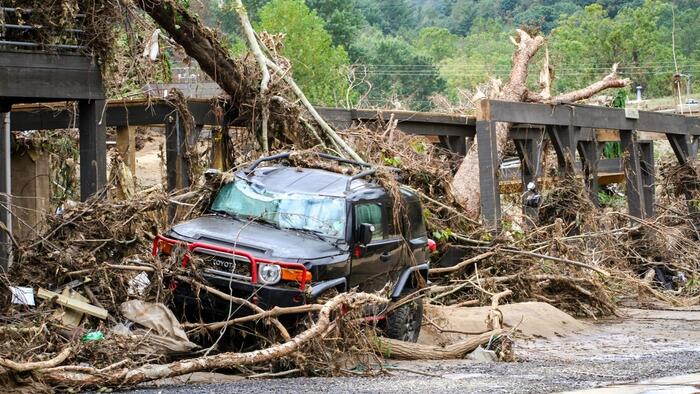As Hurricane Milton approaches Florida, the aftermath of Hurricane Helene has left Northern Carolina’s mountainous regions in chaos. Helene, which made landfall in Florida as a Category 4 hurricane on September 26, unexpectedly intensified as it moved northward, delivering unprecedented rainfall after a prior two-month drought. Local meteorologists and residents struggled to comprehend the disaster, which has claimed over 200 lives and left countless others missing. Steve Wilkinson, a National Weather Service meteorologist, noted that the true scale of Helene’s destruction was beyond the imagination of forecasters, highlighting the havoc wreaked on towns and infrastructure, including major routes like Interstate 40 and I-26.
In North Carolina, Asheville has emerged as one of the hardest-hit areas, where floodwaters have subsided but significant challenges remain. The community faces a dire water shortage as the storm devastated the local water supply system, uprooting water mains and pipes. Residents are left with no access to potable water, forcing them to survive on delivered bottled water. Dr. Carly Brown, a local physician, described the precarious conditions not only for residents but also for hospitals, which are struggling to function without a reliable water source. The crisis has profoundly affected daily life, with many residents enduring personal hardships without the ability to perform basic hygiene tasks.
In the midst of the recovery efforts, the threat of crime, particularly looting, has added another layer of distress to the community. With many residents evacuated and properties left unattended, reports of looters targeting abandoned homes have emerged. The local community has become increasingly anxious, and in response, authorities have heightened police presence and deployed military personnel to prevent further criminal activities. City officials have urged residents to remain calm and assured them that resources are being mobilized to restore order and security. The fear and paranoia surrounding crime have compounded the already overwhelming challenges faced by the community in the wake of the disaster.
The social fabric of Asheville has also been deeply impacted, with many residents returning to find their homes and belongings destroyed. The sudden influx of newly homeless individuals has stressed local shelters and services, overwhelming resources that are already stretched thin. Community leaders are particularly concerned about the lack of preparedness among this new demographic, who find themselves navigating homelessness for the first time. Many individuals that once had stable living situations now rely on temporary shelters, food banks, and donated supplies. The American Red Cross has been instrumental in providing immediate assistance, yet the demand often exceeds available resources.
Swift relief efforts are in place to alleviate the dire conditions in Asheville, with organizations distributing thousands of meals and essential supplies to those affected by the floods. Despite these efforts, the situation remains critical, with survivors needing much more than immediate aid. Community leaders like Rev. Micheal Woods emphasize the essential need for water restoration as a top priority in the recovery efforts, alongside the pressing issue of homelessness. As the region grapples with the transition from recovery to rebuilding, the heightened vulnerability of newly displaced individuals poses a serious concern. Many pre-existing societal issues, exacerbated by the storm, are now in urgent need of address.
In conclusion, the destruction caused by Hurricane Helene has left a long-lasting impact on the mountainous communities of North Carolina, notably Asheville. While the initial focus is on immediate relief and basic needs, the broader complexities of recovery, including infrastructure rebuilding, security, and support for displaced individuals, require a sustained effort from local and national leaders. As the community faces its new reality, solidarity and resilience among residents, volunteers, and aid organizations will be crucial in navigating the path toward recovery and rebuilding a stronger future.

